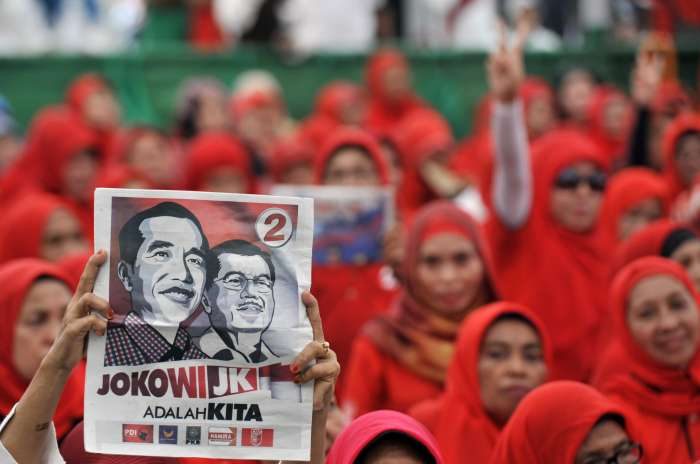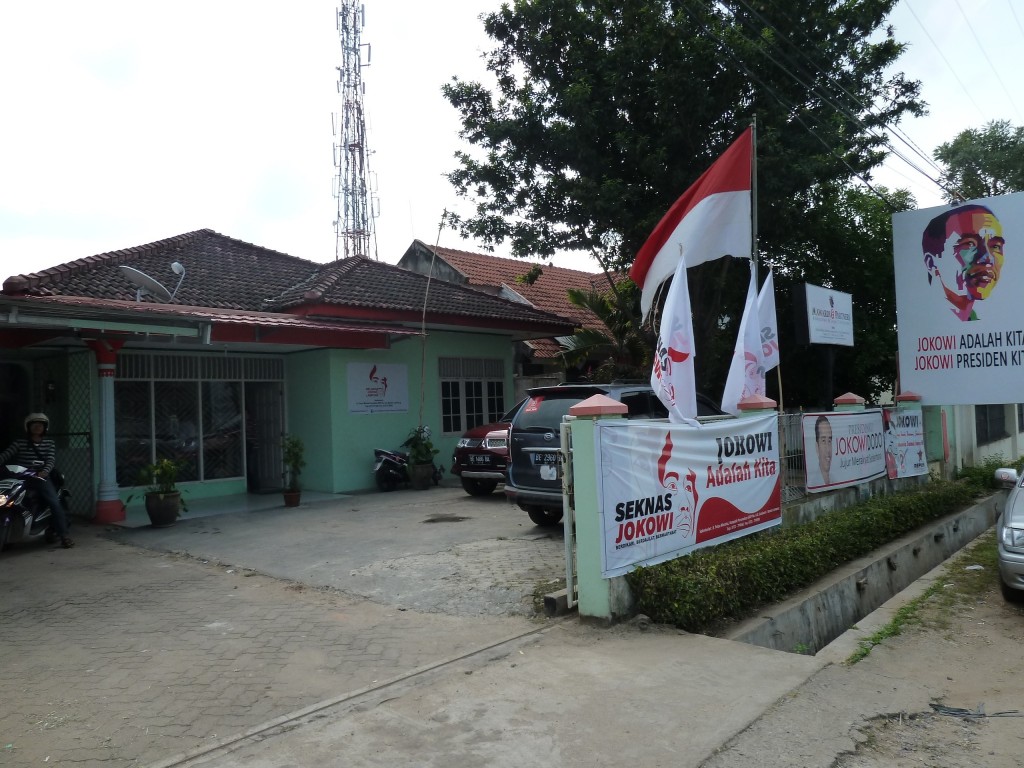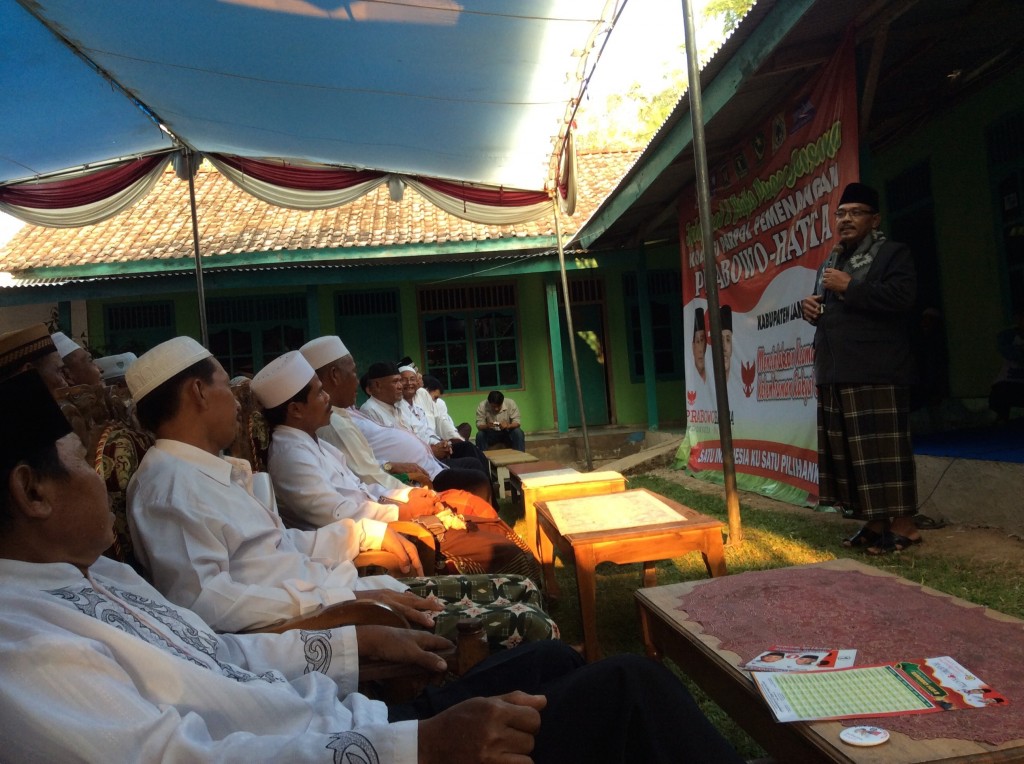“It was an angry speech. For two hours, Bu Mega spoke to the [PDI-P] in an angry tone.
Meanwhile back at our place, the atmosphere was festive”.
Riduan (name changed) chuckles in recollection of Megawati’s visit to Lampung on June 23.
That afternoon Riduan and other volunteers had organised a lomba nasi tumpeng – a shared dinner with rice festively shaped into cones – to support Jokowi’s campaign.
Riduan is a member of the Lampung’s chapter for ‘Barisan Jokowi Presiden’ (Bara JP), one of the many volunteer organizations that have sprung up during the campaign season to support Jokowi’s bid. Bara JP doesn’t belong to PDI-P, it’s just a volunteer organisation. And yet curiously, they’ve worked a lot harder this campaign season than Jokowi’s own party.
To volunteers of Bara JP in Lampung, it even felt like PDI-P were undermining their campaign efforts. For instance, on the night of the dinner, just as people were flooding into the event, Riduan recalls how a PDIP leader sent around an sms telling people that the event had been cancelled.
Riduan speculated that the leader wanted the event over before Megawati’s arrival in Lampung. “I immediately send a counter sms, saying that the event was on and PDIP leaders cannot cancel it”. The same leader failed to inform Megawati that the event was even on. “But we used our own back channels. So as soon as she arrived at the airport, she told people that she wanted to come to us”.
When Megawati saw that the dinner had been organised only by volunteers, she was livid. Behind closed doors at the Sheraton Hotel, Megawati went on a tirade, lambasting PDI-P cadres for their inactivity.
When I travelled Lampung last week, I saw that Megawati had a point. It wasn’t just that Prabowo was winning the poster war, or securing more ads in the local newspapers.
PDI-P just wasn’t doing all that much. Sure, they had organised a few big meetings (the day after, on the 24th, there was a rally with Megawati and Jusuf Kalla) and handed out the usual campaign paraphernalia, but at the village level, there was nothing going on to engage ordinary people with Jokowi’s message.
What campaign activities there were in Lampung were driven by volunteer organizations like Bara JP, Projo and Seknas Jokowi whose volunteers complained that Nasdem members were more likely to help out than PDI-P.
Worse still, the important task of recruiting and training the polling booth witnesses was only done at the last moment – something usually planned months ahead.
PDI-P’s central leadership should also shoulder some of the blame. It wasn’t that local PDI-P cadre were lazy, just that they hadn’t been given clear instructions from above about how and what to organize. More importantly, unlike over at Gerindra, there were no threats or sanctions for inactivity.
Another big problem was the lack of funds. Almost every volunteer or PDI-P member I met complained about it.
The Jokowi campaign simply did not muster the money to run an effective grassroots campaign, particularly in comparison to the well-funded Prabowo campaign.
Jokowi campaigners regularly complained that even simple, village-level meet and greets like jointly breaking the fast, prayer meetings or group discussions were a strain.
The activities that did take place were on shoe-string budget. Bara JP claimed with pride that they’d sought donations for the rice-cone dinner themselves and people had contributed by bringing along food.
At Seknas Jokowi, volunteers speculated as to why PDIP failed to go out all for their presidential candidate.
A number of theories dominated the discussion. The first one was that unlike local elections party cadres saw nothing in it for themselves. The older volunteers in particular complained that the new generation of party cadre were ‘kurang ideologis’, i.e they had no ideological affiliation to PDI-P.
Worse, the older volunteers who used to be party cadre felt side-lined by a younger, more resourceful generation who, in their opinion, are only after their own success and care little for the party.
This is a problem that each party faces: with the April parliamentary elections behind them, parties were always going to struggle to motivate local politicians to stick with the campaigning.
Yet Gerindra seems to have found two effective ways to overcome this pragmatic apathy. Firstly, the party has threatened that anybody who fails to campaign, will see his or her party membership annulled (“they are forced to work”, as one volunteer remarked).
Secondly, the Prabowo campaign is simply spending more money. More money means more motivation to have events and more success in connecting with voters, which in turn raises cadre motivation. Some of this money is raised locally, as Gerindra has demanded each elected parliamentarians to contribute 25 million rupiah (about $2000) to the campaign, something which PDIP has not done.
Finally, PDI-P’s lacklustre campaigning reflects the party’s internal divisions.
The volunteers gossiped about the division of PDI-P into two camps, one belonging to Megawati and the other to her late husband Taufik Kiemas and Megawati’s daughter Puan Maharani.
The latter faction sees Jokowi’s rise as a threat. With some venom, the volunteers at Seknas Jokowi complained that Puan Maharani believes PDIP to be her family heirloom. Her own presidential ambitions were foiled when her mother opted for Jokowi and Jusuf Kalla.
To explain PDI-P Lampung’s sluggish response on the ground, volunteers at Seknas Jokowi in Lampung speculated that the PDIP provincial leader and its outgoing governor are both allied to the Puan faction.
While its difficult to ascertain the truth of such gossiping, some party cadre at the central level as well at the provincial level might very well see a Jokowi victory as a threat to their position within the party, and hence, the reluctance to campaign.
Whatever the reason, the PDI-P’s lacklustre campaigning is likely to have big repercussions. If Jokowi wins the elections, the party seems set to experience a big shake-up. The prominence of volunteers in the Jokowi campaign and their disappointment with PDI-P members will lead to calls for a new party leadership. Already Jokowi volunteers are talking about sending petitions to HQ to demand the dismissal of inactive provincial party leaders.
And if Jokowi loses, PDI-P only has itself to blame. It is hard to underestimate the importance of an active grassroot presence in relatively remote areas like Lampung’s countryside where newspapers are hardly read and presidential debates have little impact. Campaigning in these areas is a word of mouth affair, using people on the ground to shape people’s perceptions of the two candidates.
Take the fast-breaking events that Prabowo organised throughout the province.
While villagers might simply come because they are attracted by the food, they are presented with a highly seductive mix of religious piety peppered with glowing references to Prabowo’s firm leadership and the prosperity he will bring, delivered by highly esteemed (and well-paid) local religious leaders. Lacking funds and motivation, the Jokowi campaign didn’t run these kinds of events. This means that discussions in the village didn’t get another take on what Prabowo’s firm leadership might entail.
This is, it seems to me, the main reason why the ‘kampanye hitam’, the negative and generally false rumours about Jokowi, has been been so effective and why Prabowo has risen in opinion polls over the last two months.
The successful spread of false rumours about Jokowi’s Christian and Chinese descent is largely due to the superior village-level presence of the Prabowo campaign. In Lampung, the Jokowi campaign seems to lack the manpower to counter these perceptions effectively. The more sustained grassroots presence and the (bought) support of local leaders has brought the Prabowo campaign closer to the voter’s ears, at least in Lampung.
It remains to be seen whether this grassroot presence will bring Prabowo more votes. If despite these massive financial and organisational disadvantages, Jokowi wins, then his victory will be all the more impressive.
The lack of party support would make it a real people’s victory: a victory of an ocean of volunteers over a grant coalition of better-funded and better organised political parties. Such a victory would reflect an impressive ability of Indonesians to make up their own minds in the face of a barrage of (paid) propaganda coming from newspapers, TV stations as well as village leaders. I dare not speculate on whether that is a realistic prospect.
Ward Berenschot (ward.berenschot@gmail.com) is a researcher at KITLV Leiden working on clientelism and citizenship in Indonesia.
 Facebook
Facebook  Twitter
Twitter  Soundcloud
Soundcloud  Youtube
Youtube  Rss
Rss 

